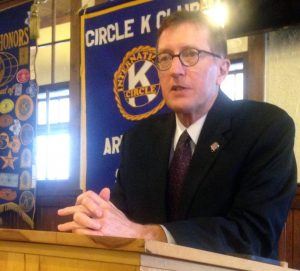Education, quality of life key to economic growth in the Jonesboro metro
by January 10, 2018 5:05 pm 532 views

Unemployment rates in Jonesboro and the surrounding region are near historic lows, but median income rates and labor participation rates are lower than the state and national averages.
Jonesboro Unlimited Vice-President of Economic Development Michael Downing said during a Kiwanis Club meeting in Jonesboro on Wednesday his organization is in the midst of a five year plan to create 2,500 jobs and raise median income rates.
There are two magic bullets the community needs to achieve its economic goals – development of better educated workers and better quality of life standards in the region’s hub city.
“Workforce talent is the number one factor in economic development. … My goal is that anyone who wants a good paying job and is willing to do what it takes should be able to find a good paying job,” Downing said.
The Jonesboro metro’s economy has demonstrated relative strength in recent years. The unemployment rate in the city is 2.8%, about three-tenths of a point less than the all-time low of 2.5%.
U.S. Bureau of Labor Statistics numbers show an estimated 62,194 employed in the Jonesboro metro during November, the latest month data is available. That’s an increase of 2.78% compared with November 2016, and an addition of 1,687 jobs in the November-to-November period. The metro jobless rate in November was 2.8%.
But, there are troubling numbers. The poverty rate is 21%, higher than the state average and nearly 10 points higher than the nationals average. The median income has hovered near $41,000, about $16,000 less than the national average.
A primary reason for these numbers is a lack of education among the populous, Downing said. Only 34% of residents in the metro area have a college degree or specialized training or certifications passed high school. The national average is 46%. By 2025 it’s estimated 60% of the U.S. population will have to have education/training passed high school to get a good paying job, he said.

Technology and healthcare will be among the top hiring sectors in the coming decade. He read a quote in a news article that he thinks sums up where the jobs market will turn.
“Growth in the economy will be led by nerds and nurses,” he said.
Another problem is labor participation. Only 62% of residents between the ages of 25 and 55 participate in the labor force in the Jonesboro metro. The number has been dropping in recent years, and it’s a trend that must change, Downing said. About 10% are disabled persons, and another 10% are people who don’t want to work. There are a number of factors to explain the expanding gap, and it’s a phenomenon found in other communities across the country. One reason could be the recent explosion in opioid addictions and its ramifications, Downing said.
Education is one key, but its not the only one, he said. Quality of life factors for young talented people such as bike trails, communal spaces, a better developed downtown area will be critical in the coming years, he said. Jonesboro has to find ways to become a “cooler” town in the eyes of younger professionals, he said.
Jonesboro Unlimited was formed in 1986 to advance economic development in Jonesboro and Northeast Arkansas. About 100 local businesses joined to create the organization and it came at a time when food processing was identified as a good fit for the region. It is part of the Jonesboro Economic Development Corporation (JEDC), a non-profit organization.
Jonesboro Unlimited completed its fundraising for its latest economic development project “Momentum Jonesboro,” to create jobs and heighten incomes It raised about $3.6 million to execute the five year job development plan.
Downing, former director of the Missouri Department of Economic Development, was hired as part of the Momentum plan. This year leaders will work with site selection consultants. He is an Arkansas State University alumnus and was the place kicker on the school’s undefeated 1975 football team.
The city has many advantages when it comes to recruiting businesses and expanding those already here. It has plentiful and cheap utilities including electricity and water. There are many shovel ready sites, the cost of living is low, and it has good interstate quality highway access, and is relatively close to Memphis. But, the education barriers have to be crossed, and livability has to be improved if the city wants to flourish in the years to come.
“We are not doing as good as we should be,” he said.
